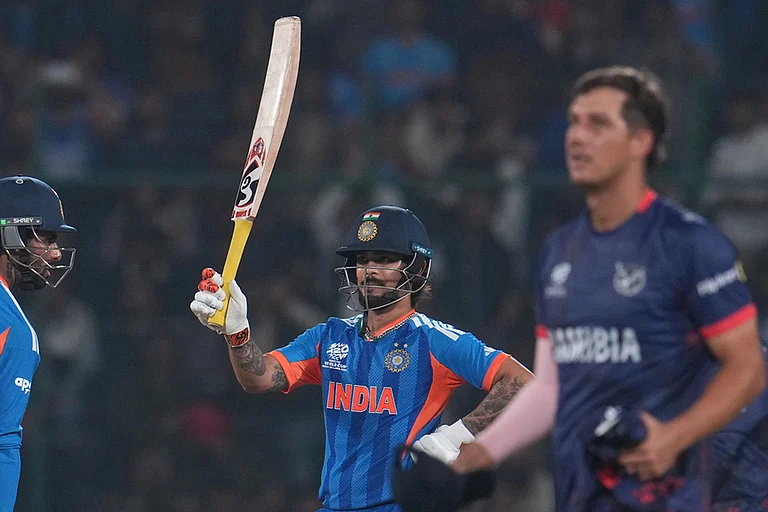The other GoM would be formed to look into related issues of e-way bills, FASTAGs, technology, compliances, plugging of loopholes, and composition schemes. The GoM would ensure maximum use of technology to curb tax evasion.
GST Council Unanimously Decides Not Right Time To Bring Petroleum Products Under GST
"It was decided, we will report to Kerala HC that, matter has been discussed and Council felt it was not the time to bring petroleum products under GST," finance minister told the media

GST Council Unanimously Decides Not Right Time To Bring Petroleum Products Under GST
GST Council Unanimously Decides Not Right Time To Bring Petroleum Products Under GST
The Goods and Services Tax (GST) Council in its 45th meeting decided unanimously, that it was not the right time to bring petroleum products under the ambit of GST.
"GST Council members made it clear they do not want petroleum products to be included under GST. It was decided, we will report to Kerala HC that, matter has been discussed and Council felt it was not the time to bring petroleum products under GST," finance minister Nirmala Sitharaman said at a press briefing post the meeting.
In June, the Kerala High Court, based on a writ petition, had asked the Council to decide on bringing petrol and diesel under GST.
The Council also announced GST rate changes in order to correct inverted duty structure, in footwear and textiles sector, as was discussed in an earlier GST Council meeting and was deferred for an appropriate time, would now be implemented from January 1, 2022.
The Council also announced extension of the existing concessional GST rates, valid currently till 30th September, 2021 on Covid-19 treatment drugs. Amphotericin B would attract nil taxes, Remdesivir at 5 per cent, Tocilizumab to attract nil taxes, andanti-coagulants like Heparin would be taxed at 5 per cent.
GST rates of Covid-19 treatment drugs like Itolizumab, Posaconazole, Infliximab, Favipiravir, Casirivimab and Imdevimab, 2-Deoxy-D-Glucose, Bamlanivimab and Etesevimab that were earlier slashed to 5 per cent would continue till December 31, 2021.
Integrated GST (IGST) on import of medicines for personal use, likeZolgensma for dpinal muscular atrophy, Viltepso for fuchenne muscular dystrophy, and other medicines used in treatment of muscular atrophy has been slashed to zero from 12 per cent.
The Council also decided that cess has to be collected beyond July 2022 for repayment of loans taken. "This cess collection has to go on till March 2026, based on the financial statements worked out now," Sitharaman said.
Sitharaman said detailed financial statements have been worked out, based on which it has been learnt that cess would have to be collected till March 2026, only for the purpose of paying back loans taken between 2020-21 and 2021-22.
"For the total amount to be borrowed this year, Rs 75,000 crore is already paid upfront to the states. For this as well as amount borrowed last year, we discussed how long the cess will have to be collected and paid to pay back the loans," the finance minister said.
To service borrowed principal and interest from July 2022, GST Council had decided last year that GST compensation needed to be paid only from cess collection, not from the Consolidated Fund of India
"The extension of compensation cess levy upto March 2026 is expected to impact consumers as the same will be recovered from them. The Council also stated the current revenue neutral rate is less than the originally agreed one, for which a GOM is set up to look into," Rajat Bose, partner, Shardul Amarchand Mangaldas and Co said.
Sitharaman said that the revenue neutral position which was 15.5 per cent at the time of introduction of GST has steadily come down to around 11.6 per cent, which was taken up for discussion today.
For gig operators like Swiggy and Zomato, among others, it was decided that since the place where food is delivered would be the point where tax is collected, it's the operators who would be collecting tax and pay the GST on it.
"The decision to make food aggregators pay tax on supplies made by restaurants from January 1, 2022 seems to have been done based on empirical data of under reporting by restaurants, despite having collected tax on supplies of food to customers. The impact on the end consumer is expected to be neutral where the restaurant is a registered one. For those supplies from unregistered, there could be a 5 per cent GST going forward. Details on this are awaited," Mahesh Jaising, partner Deloitte India, said.
The Council also decided to form two group of ministers (GoM) to look into several issues. One group of ministers would look at issues related to GST rate rationalization, such as anomalies in rate structure. The GoM would have to come up with a report on this within two months after its formation.
Published At:
MOST POPULAR
WATCH
MORE FROM THE AUTHOR
PHOTOS
×


















.jpg?w=200&auto=format%2Ccompress&fit=max)






